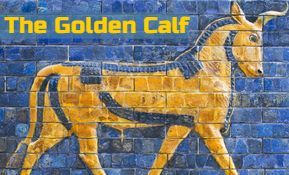
Vayera: Three Special Guests
…our purpose in this world is to connect to God and the greatest level of connecting to God is not to be with Him, but to be like Him!

“God appeared to him [Avraham]… while he was sitting at the entrance of the tent in the heat of the day” (Bereishit 18:1). It was the third day after his circumcision, and since the third day after any surgical procedure is always the most difficult, Avraham was in agony. We find no conversation between God and Avraham; instead, the Talmud says that God came to visit Avraham. It was a "visit to the sick."
To keep travelers from disturbing Avraham (Abraham), God made the day extremely hot (He removed the sun "from its sheath"). Instead of rejoicing that no guests had come to disturb him, Avraham was upset. He sat at the entrance of his tent scanning the horizon for any brave wayfarers, so that he could welcome them with shade and food.
Since God did not want Avraham to be so distraught, He sent three angels to visit him. When Avraham, recuperating from surgery at the age of ninety-nine, became aware of the three Bedouins standing outside, he literally jumped up and ran to greet them. Although Avraham had been in the middle of conversing with God, he begged the Almighty, "Don't go away" (i.e. wait here a second!) and turned his attention to his guests.
Why does Avraham leave God on "call-waiting," so to speak, to greet his guest?
Imagine that we meet a multi-millionaire relaxing on a beach chair, enjoying an icy-cold drink. “We have an offer you can’t refuse,” we tell him, “just a minute away, in a secluded room over there, we can grant you a 100% guaranteed exclusive interview with God, no strings attached.”
Anyone – even the most ardent atheist – would jump at the opportunity. To meet God face to face – that’s the greatest imaginable pleasure! It far outweighs lounging on a beach chair! For such a spiritual person as Avraham, speaking with God was the absolute pinnacle of his spiritual striving.
That's exactly what Avraham was doing: "God appeared to him." Avraham was communicating with the Almighty! So why did he leave the most spiritual experience possible to take care of some poor Bedouins?
Through his actions, Avraham was teaching his descendents, the Jewish People, that it is better to invite guests into your home than to receive the Presence of God! Avraham was letting all future generations know our purpose in this world is to connect to God and the greatest level of connecting to God is not to be with Him, but to be like Him!
Avraham understood that God had prepared everything in this world – the crunchy apples, the beautiful sunsets, the raindrops and the snowflakes – for his enjoyment. He emulated Hashem by devoting himself to benefiting others. Avraham understood that the foundation of Creation is chessed – loving kindness – and undertook to emulate this chessed as his life’s project.
Avraham's life goal was to emulate Hashem through becoming the paragon of chessed. Yet, this paragon of chessed was willing to kill his own son.
The Binding of Yitzchak (Isaac)
From a distance, Avraham saw a mountain. Over the mountains was a little cloud, unlike any cloud that he had ever seen. "This must be the place," Avraham proclaimed to his son Yitzchak.
Yitzchak, age 37, carried the firewood on his shoulders, while the elderly Avraham held the slaughtering knife and kindling in his hands.
"Father, I have a question!" Yitzchak asked. "We are going to offer a sacrifice to God. Here is the fire and the wood, but where is the lamb?"
Avraham replied: "God will seek out for Himself the lamb for the sacrifice, my son," (Bereishit 22:8) implying that Yitzchak would be the sacrifice.
"And the two of them went together" (Bereishit 22:8). They went in unison, aware of the difficult mission ahead of them.
When they arrived at the top of the mountain, Avraham built an altar and placed the firewood and kindling upon it. Yitzchak allowed himself to be tied tightly to the firewood. Then Avraham lifted the knife.
The greatest act of self-sacrifice in the annals of history was about to begin. It stood against all of Avraham's principles; it contradicted everything he had ever preached about a loving God. From then on, Avraham would no longer be able to teach the pagans about a God of kindness that shunned human sacrifice. "What happened to your son?!" would be their retort.
And what about all the promises that God made to Avraham? Yitzchak, miraculously born to parents aged 100 and 90, was destined to be the father of a nation that would light up the world. If he were sacrificed, what would be with that promise? What would be with the Jewish People?
On the other hand, if Avraham refused a direct command from his Creator, his life would be meaningless.
We’re accustomed to think that Avraham was being tested to see if he would obey God's command. This, however, is only partially correct. A tzaddik (holy man) like Avraham was always ready to obey God. That was a given. God was testing Avraham to see how he would accept the command. Would he obey the word of God without question and doubt, despite the fact that according to all logic the command did not seem to make sense?
Avraham put aside all of his questions and dutifully obeyed God's instructions. Avraham's greatness lay in his willingness to sacrifice Yitzchak, without asking any questions.
As Avraham stood there, knife in hand, ready to sacrifice his beloved son, an angel appeared to stop him. “Do not touch the lad,” the angel proclaimed. “You have passed the test, and I now know that you fear God.”
At that moment, Avraham noticed a ram struggling to free itself from a thorn bush. Avraham sacrificed the ram instead of his son. Through passing this test, Avraham was imbuing his descendents, the Jewish people, with the strength to pass similar tests of unwavering trust in Hashem, regardless of our own limited understanding and principles.










